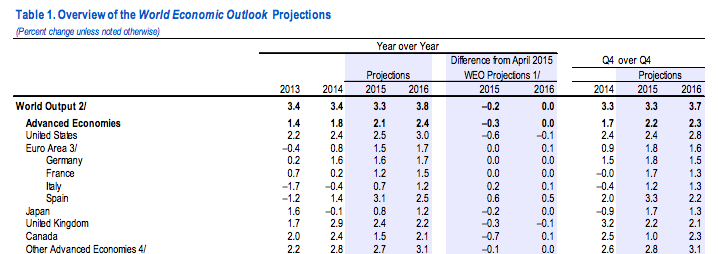Election campaigns take a toll on nuance; spin wins and circumspection goes out the window.

So you might be left a little dazed after a voluble leaders’ debate on the economy during which Stephen Harper, Tom Mulcair and Justin Trudeau spent many minutes talking over each other and moderator David Walmsley.
Here’s a quick-and-dirty rundown of some of the claims the leaders made:
Whose health care was cut, anyway?
Harper defended his government’s cutting of the Interim Federal Health Program.
“We have not taken away health care from immigrants and refugees. On the contrary, the only time we have removed it is where we clearly have bogus refugee claimants who have been refused and turned down.”
Is this true? Not quite. While refugees whose claims are established but who aren’t yet covered provincially are still getting health care under the federal program, anyone whose claim is still up in the air — whether they’ve been refused or are appealing or are waiting for their claim to be processed — is not getting care.
And as Global News has documented, even refugees who are eligible under either the federal or provisional provincial health programs are being turned away because the system is so complex health providers simply give up.
How many refugees?
As the candidates traded barbs on Canada’s refugee record, Harper claimed Mulcair and Trudeau would have had Canada throw open its doors and bring in “literally hundreds of thousands” of refugees with no security checks at all.
This is false: No one is suggesting Canada take in “hundreds of thousands” of refugees immediately and no one has suggested people be brought in with no security checks. People have, however, argued for expediting processing, while still conducting standard security checks.
Water, water, everywhere
Mulcair and Trudeau sparred briefly over a decade-old statement: Did Mulcair, then a Quebec minister, call for a debate on whether the province should export freshwater in bulk to the U.S.?
Cost this
As the candidates criticized each other’s fiscal policies, Trudeau claimed the Liberals are the only ones to have released a “fully costed” plan.
They aren’t. Global News crunched their numbers and, while the Liberals have released a fair amount of spending details, they have yet to show us the math behind their plan to get out of deficit by 2020 while continuing significant spending on initiatives such as their Canadian child benefit.
(In fairness, the NDP also has plenty of ‘splaining to do when it comes to costing its own promises.)

Get weekly money news
Cut that
Mulcair accused Harper of cutting health transfers to the provinces; Trudeau accused him of cutting programs to balance the budget.
Neither accusation is true.
Health transfers are going up — just not as much as they might have otherwise.
And the surplus is thanks to a combination of higher-than-expected revenue and lower-than-expected spending (which has garnered the feds criticism in the past).
Whose tax-free savings?
Harper slammed his opponents’ promises to cancel this year’s doubling of Tax-Free Savings Account limits, arguing that it’s an easy and affordable way for all Canadians to save.
But not all Canadians use it equally. This is from Canada’s income security survey:
Value added to what?
Mulcair touted his party’s plans to refine and process more natural resources in Canada, concentrating on “value-added” jobs rather than what he called a “rip and ship” model.
But many economists argue the lionization of “value-added” industries is misguided and economically inefficient.
We’re number 1?
Harper conceded he’d “never said things were great” in Canada economically, but claimed “we have done better than all the major developed economies.”
We haven’t — not lately, at least:

Our record does look better when you look at overall outcomes since 2009, however:
Economic charts to clip and save
Because we know these are going to come in handy over the next four (four!) weeks, some charts on how Canada’s doing
on unemployment:
on EI coverage:

on youth unemployment:
on minimum wage…

from province to province:

Do you have questions you wish the candidates had answered? Send them our way.
NOTE: Modified at 1 a.m. ET Friday, Sept. 18 to clarify Canada’s GDP growth in comparison to other G7 countries in the short and long term.












Comments